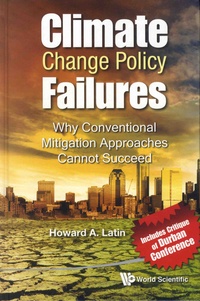[download pdf] Climate Change Policy Failures
Climate Change Policy Failures - Why Conventional Mitigation Approaches Cannot Succeed pan Howard-A Latin
Caractéristiques
- Climate Change Policy Failures - Why Conventional Mitigation Approaches Cannot Succeed
- Howard-A Latin
- Nb. de pages: 257
- Format: Pdf, ePub, MOBI, FB2
- ISBN: 9789814355643
- Editeur: World Scientific
- Date de parution: 2012
Livres téléchargement gratuit pour Android Climate Change Policy Failures - Why Conventional Mitigation Approaches Cannot Succeed par Howard-A Latin 9789814355643 (Litterature Francaise)
Overview
Stocks and flows - Most climate leaders do not understand the vital difference between reducing greenhouse gas (GHG) emissions and "reducing the increases" in the cumulative atmospheric GHG concentration. Back-loading - GHG emissions-reduction programs, including economic incentive systems, are almost always back-loaded in the sense that most GHG reductions will not take place until 2050 or thereafter, which is "too little, too late" to prevent many climate change disasters.
This back-loading policy is especially misguided due to the persistence of large CO2, discharges that will remain in the atmosphere for hundreds or thousands of years. Unequal market forces - All economic incentive programs presume that "putting a price on carbon" will lead to higher pollution costs and large emissions reductions. Yet, advocates of reliance on "market forces" have seldom acknowledged the powerful competitive advantages possessed by the "dirty" GHG-polluting fossil fuel industries drawing on their trillion-dollar wealth and political influence in many countries.
Negotiations stalemate - Climate mitigation efforts cannot succeed without the cooperation of the large GHG-polluting developing nations. Yet, emissions-reduction programs would normally impede rather than promote greater economic growth, the highest priority of most developing countries. As a result, emissions-reduction programs have reinforced the stalemate in international climate negotiations instead of helping to reconcile the conflicting interests of developed and developing nations.
Bad baseline - Most climate policymakers are using the wrong mitigation baseline, focusing on the annual GHG emissions reductions rather than on changes in the atmospheric GHG concentration. GHG-free replacement technologies - Instead of relying on emissions-reduction efforts, this book proposes a "decarbonization" strategy that would adopt GHG-free replacement technologies able to increase economic and social development without degrading the climate.
The only realistic way to cut heat-trapping gases in the atmosphere enough to decrease climate change dangers is to replace fossil fuels and other major GHG sources as rapidly as feasible with "clean" technologies, processes, and methods. Half-hearted interim measures - The adoption of weak interim emissions-reduction measures would often be more harmful than helpful because they will divert essential funding, limited regulatory resources, and public attention away from more ambitious mitigation efforts.
Pdf recommandé: [PDF] EMF*D: 5G, Wi-Fi & Cell Phones: Hidden Harms and How to Protect Yourself download link, Download PDF Charlie Hernandez & the Castle of Bones here, DOWNLOAD [PDF] {EPUB} Erectus pdf, [PDF/Kindle] Things You Can't Say by Jenn Bishop link, {pdf download} Ceux qui sauront read pdf, Descargar PDF EL TATUADOR DE AUSCHWITZ read book, AUSENCIA DE CULPA leer pdf download link, Online Read Ebook Illusion financière - Des subprimes à la transition écologique download link,

